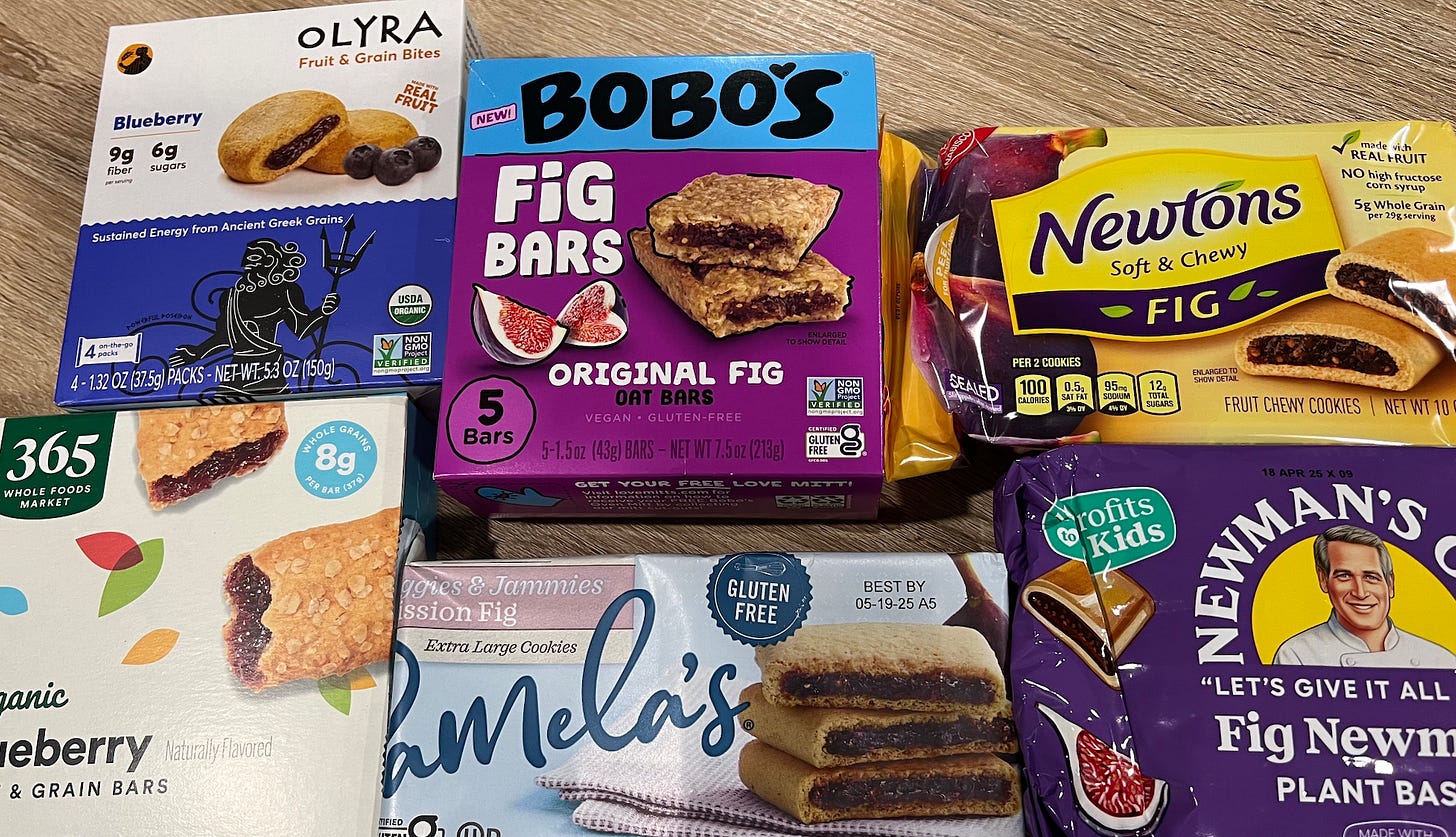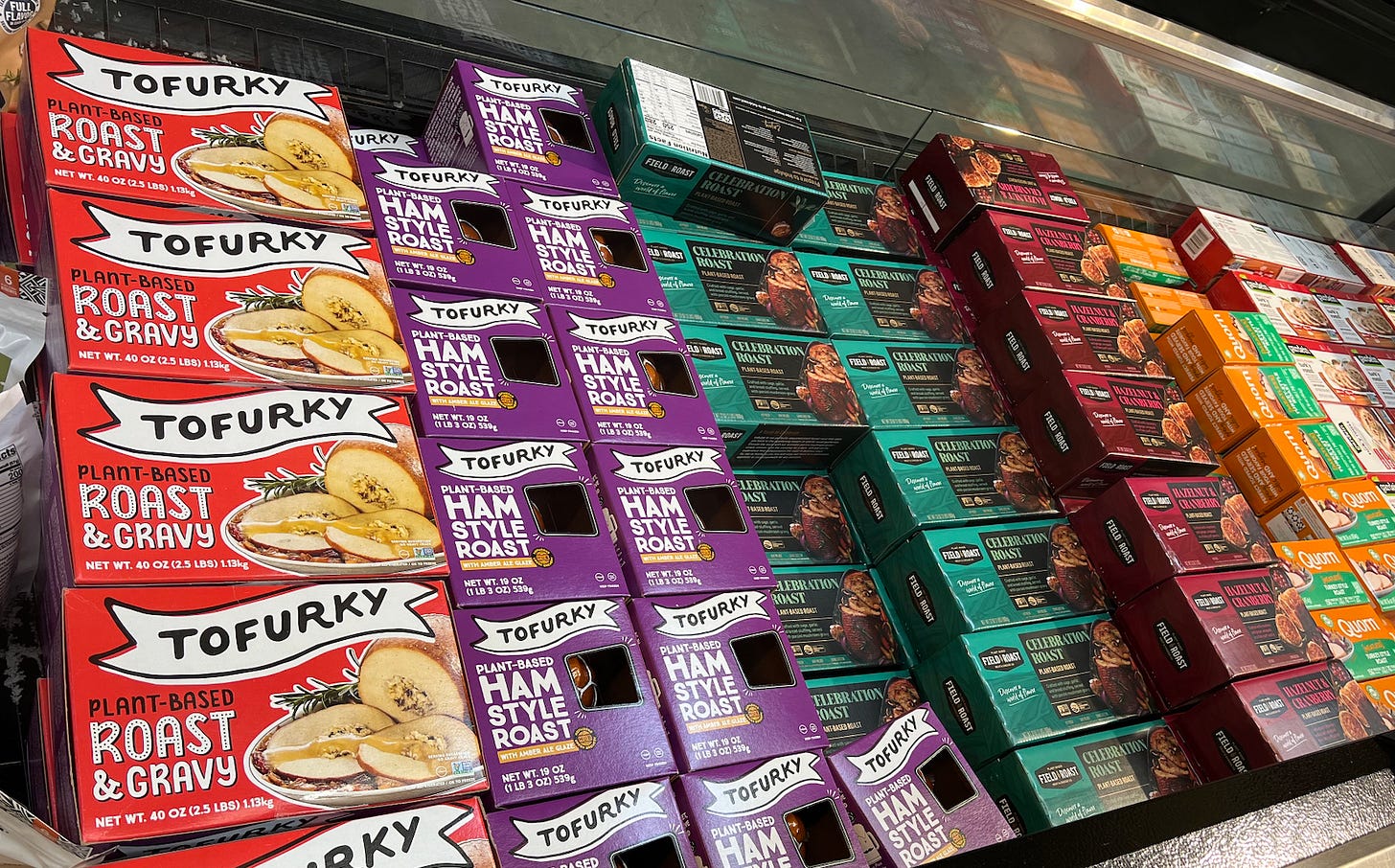Discontents: 1. Government Interference. 2. Healthier Than Ever. 3. Fig Bar Smackdown. 4. Seen In the Wild. 5. Tunes.
1. Government Interference.
A loyal subscriber wrote me something recently, along the lines of why he does not want governments meddling in the food supply. He is “against government interference”. I respect that. But it got me thinking. Always a dangerous thing. Thinking. I mean it’s not illegal yet, right? About government, markets, policy, business, laws. All the stuff that makes the food system tick, including retail, food processing, agriculture, everything. Lots to think about.
Our food supply does not function without the government.
That is not a value judgement or an ideological position. Just an observable fact. Markets are a social compact, feats of imagination made real through the construction and execution of laws, through the time, energy and efforts of entrepreneurs and productive workers up and down supply chains, through taxation, through commercial transaction enabled by government issued debt and fiat currency (or occasionally crypto currencies dependent on these), by the business and social relationships of market participants all via the power relations between all of these people and institutions, who’s in charge, who is calling the shots, all to meet the needs of the populace, in this case for food.
But who has the gold makes the rules, so to speak. Under capitalism, an economic system run by the folks with the most capital, markets are created for resource extraction and capital accumulation, by creating and distributing products in order to generate profits for their makers and their investors. Markets at this scale are not spontaneous, improvised, random, or impulsive, as much as entrepreneurs would like to think their feats of inspiration create matter and energy from the vacuum of space. Markets are neither mystical or magical. Markets are material, grounded in math and physics and readily understandable. Markets are not set in stone.
Governments, therefore, do not “interfere” in markets. Governments create and enable markets. For better and worse, and usually worse these days, governments plan for, build the frameworks, attempt to regulate and occasionally slap the hands of markets. Especially when it comes to food.
And when those markets get really concentrated among a handful of larger players, like in packaged food, grocery retail, seeds and agricultural inputs, oil and gas, etc., then governments, with rare exceptions, make sure the markets are functioning optimally for these too-big-to fail-incumbents, who in turn do much of the planning for their corners of economy, including price setting, demand planning, aggregation and allocation.
Like Walmart. With 30% market share of the grocery industry, it is one of the most intensively planned economies in the world, ever.
Walmart is not spontaneous. Their supply chains, data feeds, inventory forecasting, draconian payment terms, and best in class customer marketing and pricing strategies, are among the most centrally planned, complex, extractive, profitable and successful in the world. But Walmart can’t function without the federal government. And not just Walmart. This goes for just about all food companies big and small.
Let’s start from the beginning, a bit after the slave trade and Manifest Destiny era, like say, the early to mid-20thcentury. The modern packaged food and grocery sectors can be traced back to this time. They would not exist if they hadn’t been juiced up by the hundreds of millions of dollars in capital investments from federal subsidies during the first two world wars. With millions of troops overseas, the federal government needed hundreds of millions of pounds of non-perishable, conveniently packaged, calorie and nutrient dense, and somewhat decent tasting, food for the troops. Packaged food companies jumped at the opportunity, and after the war was won, converted all that taxpayer-funded infrastructure to civilian uses. A permanent wartime food economy. Mac ‘n cheese. Powdered milk. Frozen ice cream. Canned beer. Tinned fish and meats. Frozen vegetables and frozen meals. Comfort foods.
Packaged food companies found willing and enthusiastic customers in the growing supermarket industry, who created the shelf space, ambient, refrigerated and frozen, and built the supply chains to reach a growing population, optimistic from victory over fascism and flush with cash from large scale collective bargaining, the GI Bill and federally subsidized loans. The industrial food system became the envy of the world, or at least Cold War public relations thought so.
Retail grocers and packaged food companies are now responsible for the majority of the calories consumed daily, for better and worse. That is the market we are talking about here. And while their ownership is mostly private or publicly traded (but not publicly owned, per se) and their profits shared by a small handful of investors and executives, they can’t do anything without government support, oversight and handholding. Sad but true.
The roads, bridges, and tunnels their trucks use, those Eisenhauer-era interstates cutting north-south from Bellingham to San Diego, Duluth to Laredo, Maine to Miami and east to west from Boston to Seattle, New York to San Fran and Jacksonville to Los Angeles, enabling commerce and consumption for 300+ million people.
Trade deals define the terms of exchange.
Weighted towards the profits of the largest beneficiaries but wholly necessary to make sure those berries and ramen noodles and shrink wrapped pallets of everything packed onto container ships that somehow end up in your pantry and your belly. Trade deals don’t happen in a bubble, they are negotiated and maintained by governments on behalf of their most important capital holders, in order to provide their citizenry with stuff they can’t or don’t want to grow or make themselves and in turn, generate profits for shareholders. Tariffs are getting a lot of attention now, but they are just a way of taxing consumption on items governments have decided should be grown or made closer to home. Are they effective? Well, that depends. Trade agreements and tariffs, markets shaped and made possible by governments.
Or the legal documents of food companies, such as the contracts that define their business relationships, their cost plus or cost to serve deals, or their corporate charters that articulate their purpose, ownership, structures and governance. The accounting regulations and standards they use to report their earnings to shareholders, accounting standards that didn’t exist before the stock market crash of 1929 when companies were routinely fudging their books and overinflating revenue and profits (sound a bit like the more recent bubble and crash of 2007-8?). Until laws were passed to regulate that stuff, that is. Food safety and product labeling regulations, vital but flawed and under resourced. The inspection programs in stockyards and processing plants for worker safety and animal processing. The weak literature reviews masquerading as oversight for “generally regarded as safe” ingredients that have enabled thousands of never before seen ingredients into the food supply. The research grants to universities for crop development, heavily weighted towards agrochemicals. But still government interference in the marketplace.
The largely unenforced but nonetheless compelling anti-trust legacies of Clayton, Sherman, Robinson Patman.
Imagine if speed limit or drug possession laws were enforced as little as anti-trust. Life would be so much more exciting! But alas. The federal milk rule, incomprehensible in its complexity in calculating and mandating the farmgate price of fluid milk, and the not-so-coincidental export or dumping of surplus milk to other markets. Or processing it into 1.4 billion pounds of “gub’mint cheese”. IYKYK.
Crop subsidies, especially during trade wars, but always underwriting ethanol, cattle feed, distiller’s grains, GMO corn and soy, chemical intensive monocultural farming, to such an extent that growing real food, like fruits and vegetables, is sidelined in farm policy as “specialty crops”. LOL. Not a free market, by any stretch of the imagination.
The SNAP and WIC redemptions which feed 10 times as many people as all food banks combined, among the largest of their kind in the whole world, which keep tens of millions of Americans from starving in the richest country in the world that still pays starvation wages. This welfare system which also provides 10-15% of all annual retail grocery sales, and much higher in Walmart and discounters where the working poor do most of their shopping. And that Walmart’s business model depends on their employees accessing government benefits to make ends meet. Not a free market.
The labor laws and minimum wage laws that don’t even cover all workers in the food system, especially farmworkers, and are a far cry from ensuring wage earners can thrive on what they make, but are still vastly better than nothing. Or the labor board whose legal existent is being called into question by some of the biggest violators of labor law, foxes barnstorming the henhouse.
Organic food production, overseen by a citizen board of farmers, business owners and advocacy groups and outsourced to third party certifiers, but still kept up by federal regulators. Food procurement for thousands of government programs, feeding hundreds of millions of students, prisoners, soldiers, senior citizens. Not a free market.
And on and on. Government is of, for, by the people. That’s what we were taught, that is what our founding documents say. But markets don’t exist outside of that. The grocery sector is highly consolidated and heavily weighted towards the big, incumbents, our own zaibatsu or keiretsu, enormous concentrations of wealth and power, bigger in turn than many governments. Processed food that causes health issues, environment, food safety and other externalized costs that add up to a negative balance sheet 30% larger than the grocery industry. This is the marketplace that has been enabled by all these laws and regulations and frameworks. You don’t have one without the other.
But as Brecht wrote, the job of a citizen is to keep their mouth open. Government doesn’t deserve praise for maintaining the marketplace. You don’t cheer on the government like your favorite sports team, it doesn’t have feelings. But its role must be acknowledged and understood. As should this. The only real power in this equation is our ability to keep this all in check, to demand accountability, transparency, fairness, justice. That is the real government interference.
Eternal vigilance is the price of liberty- Wendell Phillips.
2. Healthier Than Ever.
So, let’s say you want to make American healthy again. You voted for Donald Trump. No judgements here. You really dig RFK, Jr. That family history. Those piercing blue eyes. His incisive criticisms of chemical intensive, ultra-processed food and some pretty spot on statements about the corruption of the for-profit pharmaceutical and insurance complex. Maybe you or a family member had a bad vaccine reaction, or you just don’t like the government telling you what to do with your body.
You are willing to overlook some of the wackier shit, especially that dead bear in the park, the whale beheading, the brain worm, or why Jews and Chinese were predisposed to survive Covid-19. Or his 37 or so mistresses and affairs and his wife’s suicide. No one’s perfect.
And now, you are stoked. Your guy won. It is time to Make America Healthy Again. It is time to purge the special interests from the regulatory bodies. Make the agrochemical industrial complex be accountable for glyphosate and their poisons and get them out of the food supply. Time to expand regenerative agriculture and get the processed junk out of school food. Get the food dyes out of processed foods. All valid, admirable and worthwhile.
Or maybe you are a yoga practitioner or an MMA gym-rat UFC fan and all your yoga and MMA friends voted Trump, and you couldn’t think of a reason why to not. Or your alternative doctor who has been able to treat Covid-19 through unorthodox means and fears the FDA will take away her license told you how scared she was of the Harris relationship with Big Pharma. Or you tuned into your favorite web personalities that rant against gender affirming surgeries, even though you don’t know any transgender people, or “soy boy” vegans, even though you eat your vegetables. Media types that hate Dark Brandon and his mixed bag brand of big government and Federal Reserve-friendly liberalism, like Joe Rogan or that crotchety Canadian shrink, what’s his name… something Peterson? These are all real possibilities.
Or maybe you are willing to overlook some of the externalized costs of #MAHA aligning with Trump. Like the government policing what women do with their bodies. Or that Fox news dude with the religious fundamentalist crusader tattoos who may run the Department of Defense, the largest employer in America, the largest military in the world by a long shot, with over 900 bases around the world and $900 billion or so annual budget. He may soon have the nuke codes. Or that plan to deport 20 million or more people who are here “illegally”, supposedly eating dogs in Ohio and “poisoning the blood of the nation”. That making America healthy again means ridding our body politic of these people and the tens of billions in taxes they pay annually, millions of whom form the foundational labor force for this food supply.
Or those industry plants Trump now wants to put in charge of the EPA and the DOE, foxes watching henhouses at the global scale. Or the rampant misogyny, rape, pedophilia and sexual harassment that seems so common among men in power, which the GOP surely doesn’t have a monopoly on, but come on, seriously, even this seems a bit out of control. Or those Charlottesville marching white power dudes and the sweaty Proud Boys storming the Capitol, with their Fred Perry polo shirts, swastikas, Gadsdens and confederate flags. Or maybe being so fed up with your employer and their woke corporate virtue signaling while you struggle with housing, food, gas prices. Donald will fix it. Right?
Strange bedfellows will make American healthy again.
It is ok to be fed up with the status quo. It means you are human. This is not an easy place to live in and it has been a rough few years, even if things like “the economy” are supposedly doing great. But at some point you have to draw a red line. We are not who we vote for.
Making American Healthy Again could also mean standing with immigrant communities and food workers that will feel the brunt of deportation and denaturalization efforts or being herded into de facto concentration camps in numbers we can’t really grasp.
That advocating for soil conservation and rotational grazing doesn’t mean gutting the vibrant immigrant communities that make America great, and always have since Emma Lazarus wrote that poem.
It could mean supporting Planned Parenthood and pushing back against further criminalization of women’s bodily autonomy. That getting food dye out of snack bars doesn’t mean banning abortion in 50 states. Their bodies, their choice, just like how you feel about vaccines, right?
It could mean demanding peace and an end to the war machine and our overseas foreign conflicts and pushing back against religious nationalism and using the military against its own citizens.
It could mean not letting polluters run their regulatory agencies and undermine everything that #MAHA aims to achieve. Right? This is right there in the #MAHA mission statement. “We aim to dismantle the corporate stranglehold on our government agencies that has led to widespread chronic disease, environmental degradation, and rampant public distrust.”
And it could mean aligning with the millions of folks who cast a vote for Harris-Walz at varying levels of enthusiasm, from side-eyes and exasperated sighs all the way up to stump speeches. Who thought they were a better choice than the other guys, even if you disagree. Aligning with the folks who are also working to get the junk out of the food supply, and have been for decades, who want to kick the polluters out of the regulatory agencies, who are expanding Good Food Purchasing standards and regenerative and organic food production, while also protecting women’s bodily autonomy and personal choices, supporting living wages, safe and dignified working conditions, freedom of association, freedom from fear for all food workers, and so much more that is existentially threatened by the externalized costs of a #MAHA Trump alignment.
The kind of stuff that would make America healthier than ever.
3. Fig Bar Smackdown.
I grew up eating fig bar cookies. They give me a lot of nostalgia. But I realize I haven’t kept up with this whole fig bar category lately. So I figured it was time for a FIG BAR SMACKDOWN. Tasting notes and star ratings (out of 5) below.
Fig Newtons: The O.G. The national brand equivalent. Flavor notes: Dry, mildly sweet, papery, dusty, dry, barely any flavor, very little figginess, Quite a ripoff. Overprocessed junk. My nostalgia is now dead. Sad. 12g sugar. 1 star.
Fig Newmans: Denser, less sweet, no real flavor, chewier, lots of filling, obviously supposed to be healthy. 10g sugar. 2 stars.
Pamela’s: Sweet and flavorful, dry and dense, fig forward, crunchy and more crumbly, less dusty. Quite good and gluten free. 12g sugar. 4 stars.
Bobo’s Oat Fig Bars: Dense, minimal filling, barely taste anything but sweetness and oats. Oats are champion ingredient. Needs actual figs? 11g sugar. 2 stars.
Whole Foods 365 Fruit Bars: Very sweet, moist, not chewy, dry and crumbly. No figs but lots of other ultraprocessed organic ingredients! 12g sugar. 2 stars.
Nature’s Bakery: Dry, cakey, dense with minimal flavor, only a little filling, mildly sweet, mostly meh. 12g sugar. 3 stars.
Olyra: Fruity, moist, sweet but not too dense, very flavorful, tastes like real fruit not just sugar. Very impressive. 6g sugar. 4 stars.
4. Seen In The Wild.
Buc-ee’s, seizing the moment in their inimitable way. Buc-ee’s, by the way, pays living wages. Go beaver, go.
It is that time of the year again. So many choices for the animal-free holiday dinner!
5. Tunes.
Seriously, everyone is Bugging’ Out. RIP Phife Dog, one of the GOATs.
peace.








Fantastic. Thanks for the refreshing and sobering take on MAHA & JFK Jr.
One of your best columns yet. Thanks